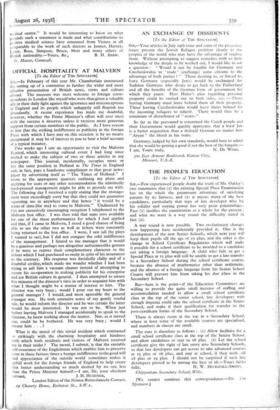OFFICIAL HOSPITALITY AT MALVERN [To the Editor of THE SPECTATOR]
SIR,—In February of this year Mr. Chamberlain announced the setting up of a committee to further the wider and more effective presentation of British news, views and culture abroad. The measure was most welcome to foreign corre- spondents in London like myself who were thus given a valuable ally in their daily fight against the ignorance and misconceptions of England and its people which unhappily still flourish too abundantly. A recent experience has made me doubtful, however, whether the Prime Minister's effort will ever meet with the success it deserves unless it receives more generous support from certain members of the public. As I have reason to fear that the striking indifference to publicity in the foreign Press with which I have met on this occasion is by no means exceptional it may be of interest to you to hear a brief account of a typical instance.
Two weeks ago I saw an opportunity to visit the Malvern Festival, which. interesting cultural event I had long since wished to make the subject of two or three articles in my newspaper. This journal, incidentally, occupies more or less the same position in Holland as The Times in England and, in fact, pays a handsome compliment to that great news- paper by advertising itself as " The Times of Holland." I wrote to the appropriate quarters outlining my plans and applying for seats or any other accommodation the admittedly hard-pressed management might be able to provide me with. The following day I received a-reply stating that the manage- ment were exceedingly sorry but that they could not guarantee squeezing me in anywhere and that hence " it would be a waste of time [for me] to come to Malvern." Undaunted by this not excessively encouraging reception I telephoned to the Malvern box office. I was then told that seats were available for one of the three performances for which I .had applied and that, if I came to Malvern, I stood a good chance of being able to see the other two as well as tickets were constantly being returned to the box office. I went, I saw (all the plays I wanted to see), but I did not conquer the cold- indifference of the management. I hinted to the manager that it would be a gracious and perhaps not altogether unbusinesslike gesture if he were to restore their complimentary character to the tickets which I had purchased so easily in spite of his assurances to the contrary. His response was decidedly chilly and of a doubtful civility,which made me wonder whether I had been trying to sell him a vacuum cleaner instead of attempting to secure his co-operation in making publicity for his enterprise and for British culture in general. I then attempted to secure five minutes of the director's time in order to acquaint him with what I thought might be a matter of interest to him. The director was very busy ; would I pour out my heart to the general manager ? I would, and most agreeable the general manager was. He took extensive notes of my gently woeful tale, he would inform the director and he was certain the latter would be most interested. It was not to be. When just before leaving Malvern I managed accidentally to speak to the director, he knew nothing about the matter. Nor, as it turned out, could he be bothered. He was very busy ; would I excuse him . . . ?
What is the moral of this trivial incident which contrasted so strikingly with the charming hospitality and kindness with which both residents and - visitors of Malvern received me in their midst ? The moral, I submit, is that the enviable self-assurance of the Englishman which enables him to preserve even in these furious times a benign indifference to the good will and appreciation of the outside world sometimes makes it uphill work for the foreign friends of England to help create that better understanding so much desired by no one less than the Prime Minister himself.—I am, Sir, your obedient


































 Previous page
Previous page